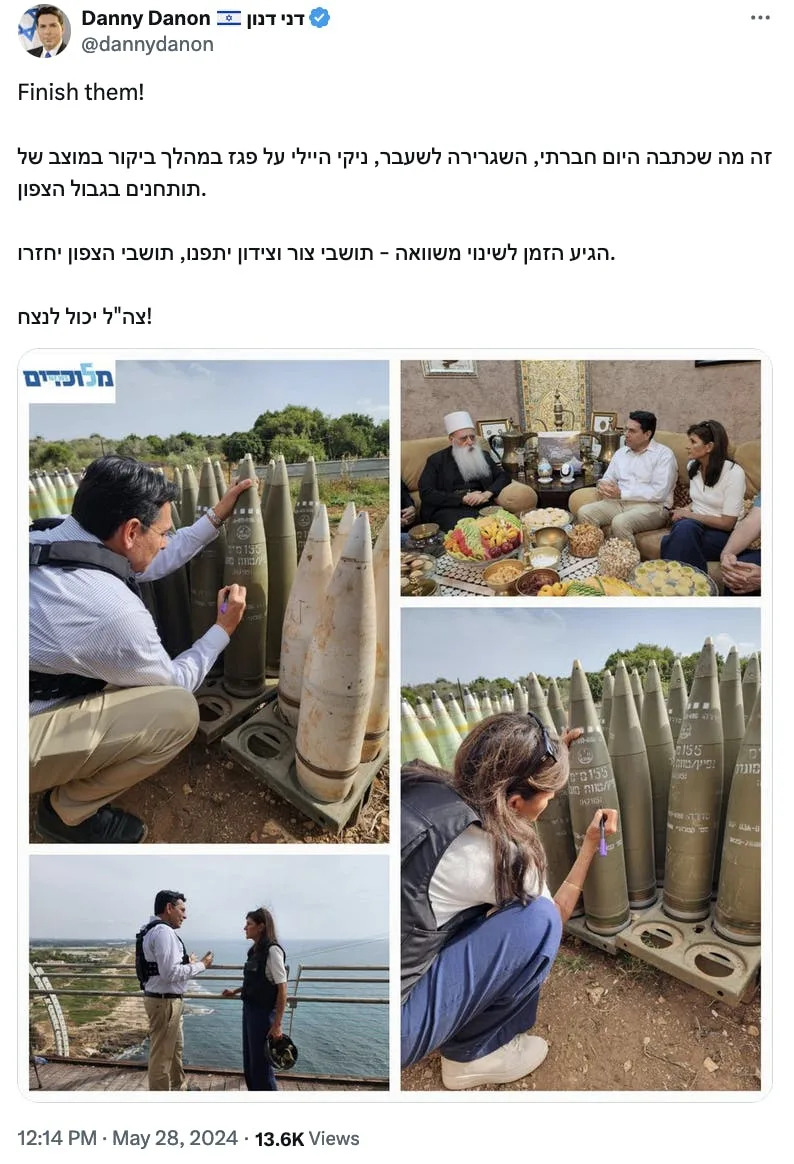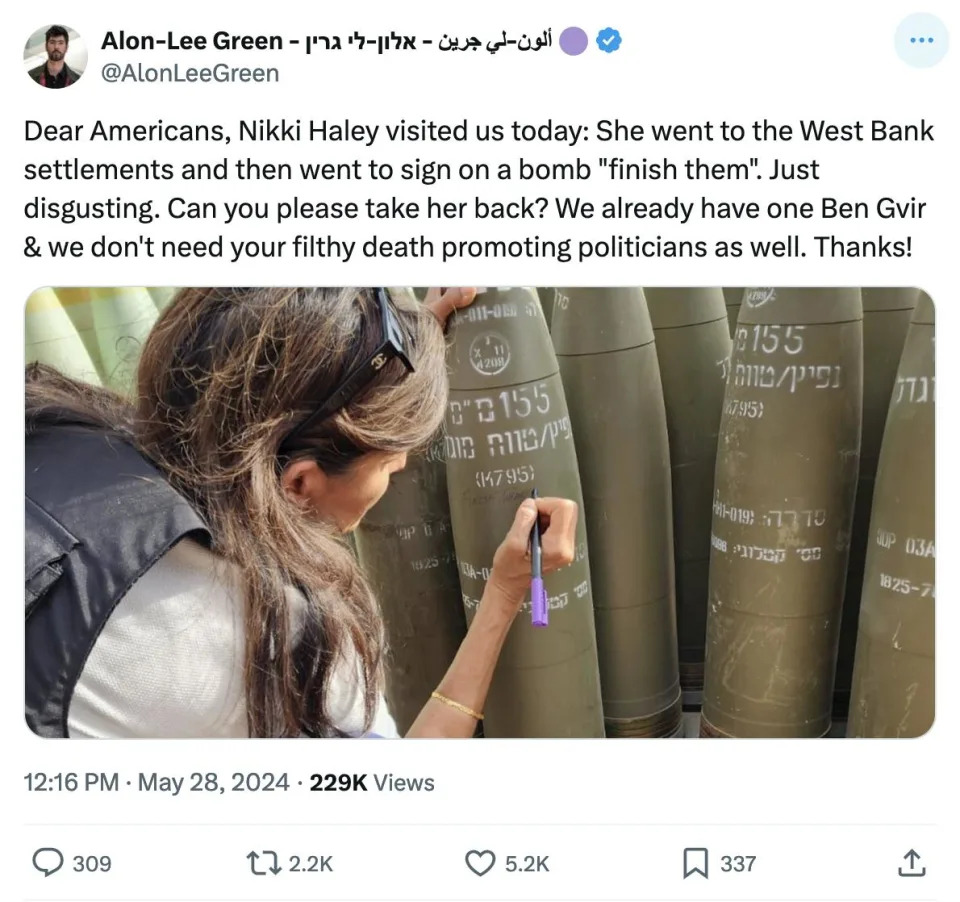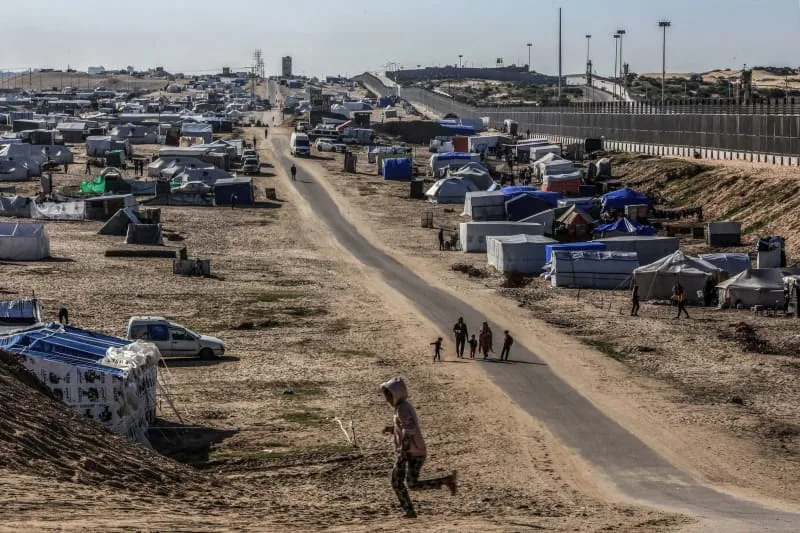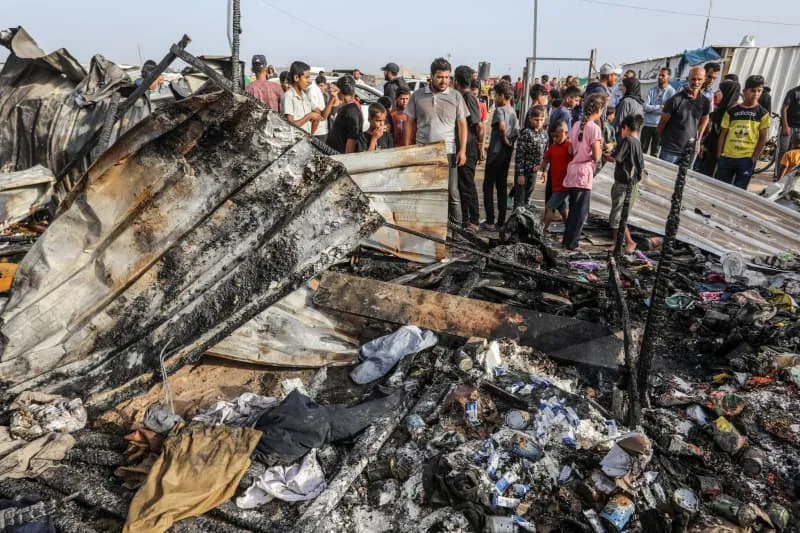Israeli airstrike that killed dozens in Rafah carried out using type of bomb supplied by US
Footage filmed by Palestinian journalist Alamuddin Sadiq at the scene of the strike appears to indicate which specific munition was used, 1,000 of which were supplied by the US to Israel in 2023.
By Sam Doak, OSINT producer
Sky News
Wednesday 29 May 2024
On the night of 26 May, an Israeli airstrike hit the neighbourhood of Tel al Sultan in Rafah.
At least 45 people were killed as structures in an area housing displaced Palestinians were set alight, according to the Hamas-run health ministry in Gaza.
Location of the strike

Image:Pic: Sky News and Planet Labs PBC
The affected area is less than 200 metres from the United Nations Relief and Works Agency's compound in the north of Rafah.
Geolocated footage and satellite imagery shows the strike destroyed buildings immediately adjacent to a sign identifying Kuwaiti Al-Salam Camp 1.
While it is unclear whether the buildings are part of the camp, Kuwaiti Al-Salam Camp 1 is known to house Palestinians displaced by the ongoing conflict.
Over much of the conflict, the surrounding area has been occupied by tents and sheds housing displaced people. In recent weeks, the number of these structures has decreased as Palestinians fled in advance of Israel's ground offensive in Rafah.
Verifying footage
To build a picture of what happened immediately after the strike, Sky News verified numerous videos and photographs captured by those present.
 Image:Fire rages following an Israeli strike on an area designated for displaced Palestinians in Tel al Sultan. Pic: Reuters
Image:Fire rages following an Israeli strike on an area designated for displaced Palestinians in Tel al Sultan. Pic: Reuters
A sign and other distinctive features visible in footage recorded in the immediate aftermath allowed it to be matched to a daytime recording from the same scene.
 Image:Footage of a man carrying a beheaded child (L) matched with a video of the same scene (R)
Image:Footage of a man carrying a beheaded child (L) matched with a video of the same scene (R)
Landmarks visible in the daylight made it possible to determine the exact location of the strike, and verify pieces of footage recorded at night in the same place.
The footage ultimately verified by Sky News shows numerous bodies being pulled from the wreckage of destroyed buildings. In one video, a man can be seen carrying the body of a decapitated child.
Satellite imagery captured by Planet Labs PBC on 27 May shows four buildings were destroyed in this strike.
The Israeli account
In a statement given on 28 May, a senior Israeli military official claimed the deaths of civilians were the result of an attempt to kill two senior members of Hamas, and that the site is close to an area used to launch rockets.
According to Rear Admiral Daniel Hagari, two 17kg (37lb) munitions were used. Claiming that much of the destruction was caused by a subsequent fire that could not have been solely ignited by munitions of this size, Hagari stated that this was being investigated.
The weaponry used in this strike

Alamuddin Sadiq
Footage filmed by Palestinian journalist Alamuddin Sadiq at the scene of the strike appears to indicate which specific munition was used.
Recorded the day after the strike, the fragments resemble the tail section of a GBU-39 Small Diameter Bomb (SDB).
According to Rahul Udoshi, a weapons specialist at the defence intelligence company Janes, the fragment "appears to be tail section of GBU-39 SDB (of Israeli Air Force stock)." Noting the similarity, Udoshi pointed out "the screw and cut section next to that", which he described as an "exact match".

Comparison of munition fragments with reference image. Pic: Janes
Reviewing the same image, Chris Cobb-Smith, a former British army artillery officer and director of Chiron Resources, also concluded that it matched a GBU-39 SDB, describing the munition as "an advanced, state-of-the-art weapon".
According to Sipri Arms Transfers Database, Israel received 1,000 of these munitions from the US as recently as 2023. Bloomberg, reporting at the time, states that this delivery was accelerated following the 7 October Hamas attack.
Aerial footage
During his statement, Rear Admiral Hagari shared a video showing the strike filmed from above. Highlighting the specific buildings that were targeted, the video shows that out of the four destroyed, these were the second furthest east and the structure immediately to its west.

People visible in IDF footage of area targeted. Pic: IDF
On the loss of innocent life, Hagari said "our aerial surveillance was filming prior to the strike in order to minimise civilian harm".
In the footage shared by the Israeli military, Sky News identified four people moving in the immediate vicinity of the targeted building in the seconds before it was hit.
Humanitarian zone
Prior to its ground offensive in Rafah, Israel produced a map marking an evacuation area and humanitarian zone.

Sky News
The area targeted lies between these two zones, in the neighbourhood numbered by the Israeli government as 2372.
No Safe Zone: Satellite Images show Israel targeting Rafah refugee camps
Israel’s PM Benjamin Netanyahu has described the airstrike that killed dozens of people at Rafah refugee camp as a “tragic mistake”.

Displaced Palestinians inspect their tents destroyed by Israel's bombardment in Rafah city. (AP photo)
Bidisha Saha
New DelhiMay 28, 2024
Posted By: Anuja Jha
In ShortIsrael's attack on Rafah continues despite world court's order
Recent attack targeted tent camp for displaced Palestinians in Rafah, killing 45
The attack has drawn global outrage, Israeli PM called it a 'tragic mistake'
Blood, chaos, and screams engulfed Gaza’s southern city of Rafah once again after an Israeli airstrike hit one of its largest camps for displaced Palestinians. The death toll from the bombing in the designated “safe zone” reached 45 on Tuesday. The majority of victims were women and children.
The strike goes against a ruling by the top UN court, the International Court of Justice (ICJ) which ordered Israeli forces to stop their military offensive in Rafah.
Now India Today has located the site of the recent airstrike at Kuwait Peace Camp. The findings were confirmed by satellite images sourced from Planet Labs PBC which showed smoke billowing from near the camp which lies just about 300 meter north of the IDF-declared humanitarian zone.

In December last year, IDF released a map that labeled the area near the UN facility as a ‘humanitarian zone’. The Kuwait Al-Salem Camp wasn’t set up at that time. The IDF also released a map where they've broken Gaza's area into numbered "blocks". The block where Monday’s strike happened lies in block ‘2372’, while it was previously marked as a safe zone, it's not currently in the humanitarian zone marked by IDF.
Footage of the aftermath shared on social media showed chaotic scenes.
In one video, the lifeless body of a man was seen being dragged by the legs out of the flames. “He’s dead, he’s dead,” a rescuer says before moving on to find others. In another video, a man wept as he held up the headless body of a toddler for the camera. Women shrieked in grief as children peered into the fire. A man with a bloodied face stood in apparent shock, examining his wounds with one hand, as he held an infant with blood-stained clothes in the other arm. One of the bodies pulled out of the fire was charred-stiff.
By Monday morning, the camp was in ruins with small fires still burning. Men and boys gathered around, rummaging through the burned and smoking wreckage for food and their belongings as drones hovered above. One of the structures still standing was a sign that read: “Kuwait Peace Camp 1.”
Children and women living in makeshift tents were among those killed, according to a post on X from UNRWA Commissioner-General Philippe Lazzarini.
The ICJ ordered Israel to “immediately halt” its military operation in Rafah, and any other action in the city, “which may inflict on the Palestinian group in Gaza conditions of life that could bring about its physical destruction in whole or in part.”
The IDF said the attack was conducted based on “prior intelligence” indicating that senior officials of Hamas’ West Bank wing were present at the site.
Israeli Prime Minister Benjamin Netanyahu told parliament on Monday that “something unfortunately went tragically wrong” with the airstrike. “We are investigating the incident and will reach conclusions because this is our policy,” he said.
This is not the first time that Israel has attacked a refugee camp. On May 24, the IDF also bombarded tents and refugee camps near Khan Younis which falls under the ‘humanitarian zone’. Remote sensing data from Planet Labs PBC shows over 800 camps set up in the area.

Planet images from May 18 show plumes of smoke rising from the Jabalia refugee camp. Numerous other structures used as civilian shelters have also been attacked in the past 10 days.

An Israeli airstrike on Al-Shaboura refugee camp in southern Gaza City on May 2 killed two young children and injured several other people, according to the Palestinian Civil Defense in Gaza and the Kuwait Hospital in Rafah.
Worsening crisis
More than 85% of the Palestinian territory’s population had sought shelter in Rafah having fled fighting elsewhere, and a million people have been forced to move again since Israel’s ground operation began on May 6. Israeli ground troops have so far probed Rafah’s southern and eastern outskirts, rather than its overcrowded center.
Aid deliveries have slowed to a trickle, with the Rafah and nearby Kerem Shalom crossings effectively blocked. Humanitarian operations in Gaza face severe access restrictions, including the closure of key crossings, denied missions, and delays imposed by Israeli authorities.
According to Office for the Coordination of Humanitarian Affairs (OCHA), between May 1 and 20, 183 humanitarian aid missions in Gaza were coordinated with Israeli authorities. Of the 51 missions to northern Gaza, only 37% were facilitated, while the rest were denied access, impeded, or canceled. In southern Gaza, of the 132 missions, only half were facilitated, with the other half denied access, impeded, or canceled.
International censure of Israel’s war against Hamas has grown steadily in tandem with the death toll and humanitarian crisis in the strip. Still, Israeli officials have repeatedly said that a ground operation in Rafah, where it believes Hamas’s leadership and four battalions of fighters are camped out with Israeli hostages, is necessary for “total victory”.
Friday’s order from the ICJ is binding, but not enforceable. Several countries called on Israel to obey the 13-2 majority decision in the wake of the Rafah strike.
International response
Qatar, a key mediator between Israel and Hamas in attempts to secure a ceasefire and the release of hostages, said the Rafah casualties would complicate the protracted negotiations. The Israeli daily Haaretz reported later on Monday that Hamas had decided to pull out of the latest proposed talks over what its senior leadership described as a massacre.
French President Emmanuel Macron said he was "outraged" over Israel's latest attacks. "These operations must stop. There are no safe areas in Rafah for Palestinian civilians," he said on X.
German Foreign Minister Annalena Baerbock and the EU foreign policy chief Josep Borrell said the International Court of Justice ruling must be respected.
Over 36,000 Palestinians have been killed in Israel's offensive, Gaza's health ministry says. Israel launched the operation after Hamas-led militants attacked southern Israeli communities on October 7, killing around 1,200 people and seizing more than 250 hostages, according to Israeli tallies.
The Palestinian Ministry of Foreign Affairs based in the West Bank condemned "the heinous massacre." Egypt also condemned Israel's "deliberate bombing of the tents of displaced people", state media reported, describing it as a blatant violation of international law.
On Monday, the Israeli military said it was investigating reports of an exchange of fire between Israeli and Egyptian soldiers close to the Rafah border crossing with Gaza.
Egypt's military spokesperson said that shooting near the Rafah crossing led to the killing of one person and authorities were investigating.
"On top of the hunger, on top of the starvation, the refusal to allow aid in sufficient volumes, what we witnessed last night is barbaric," Ireland's Foreign Minister Micheal Martin said.
Danny KEMP
Tue, May 28, 2024
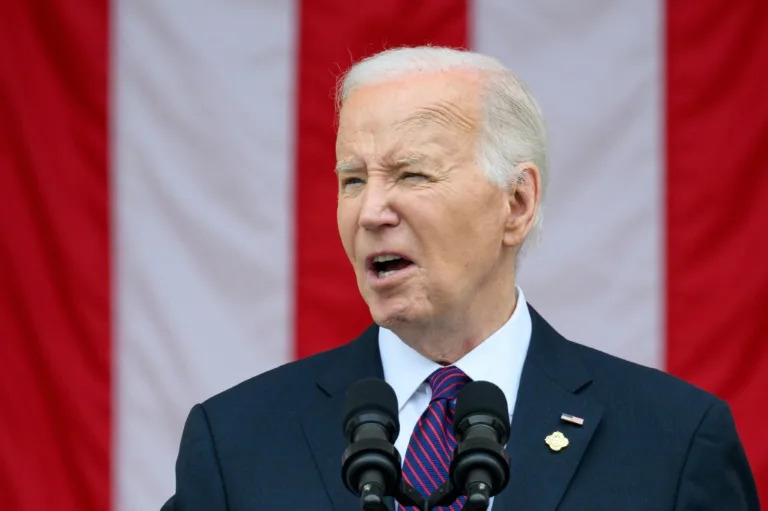
US President Joe Biden faces growing domestic and international pressure over Rafah (Mandel NGAN)
Joe Biden's red lines over Israel's assault on Rafah have kept shifting, but the US president faces growing pressure to take a firmer stance after a deadly strike in the Gazan city.
Despite global outrage over the attack in which 45 people were killed, the White House insisted on Tuesday that it did not believe Israel had launched the major operation that Biden has warned against.
John Kirby, the US National Security Council spokesman, said that Biden had been consistent and was not "moving the stick" on what defined an all-out military offensive by key ally Israel.
But Biden faces a difficult balancing act both domestically and internationally over Gaza, especially in a year when the 81-year-old Democrat is locked in an election battle with Donald Trump.
"Biden wants to appear tough on Rafah, and has really tried to be stern with (Israeli Prime Minister Benjamin) Netanyahu, but in an election year, his red lines are increasingly blurred," Colin Clarke, director of research at the Soufan Group, told AFP.
"I think he'll continue shifting those lines, ducking and weaving, largely in response to events on the ground."
- 'Smash into Rafah' -
Facing US campus protests over his support for Israel, Biden said earlier this month that he would not supply Israel with weapons for a major military operation in Rafah, and he halted a shipment of bombs.
Yet he has since taken no action even as Israel has stepped up air attacks and, as of Tuesday, moved tanks into central Rafah.
Instead, the White House has largely retreated to arguing about what does, and does not, constitute an invasion.
National Security Advisor Jake Sullivan said last week there was "no mathematical formula" and said that "what we're going to be looking at is whether there is a lot of death and destruction."
At the White House on Tuesday, his colleague Kirby faced intense questioning over the Israeli strike, which sparked a fire at a displaced persons camp in which dozes of people burned to death.
Kirby said the deaths were "heartbreaking" and "horrific" but again said there would be no change in policy towards Israel.
"We have not seen them smash into Rafah," he said.
"We have not seen them go in with large units, large numbers of troops, in columns and formations in some sort of coordinated maneuver against multiple targets on the ground."
But internationally the pressure is growing on Biden, a self-described Zionist who has stuck by Netanyahu despite deep disagreements since the war began with the October 7 Hamas attack.
Questions are mounting over how long the United States can tolerate an Israeli assault on Rafah when the International Court of Justice -- the UN's top court, of which both the US and Israel are members -- ordered it to stop.
- 'Balancing act' -
Political pressure is also mounting on Biden at home.
Protests against his support for Israel have roiled university campuses across the United States, while many on the left wing of his Democratic Party also oppose his stance.
Republicans however have assailed Biden over what they say is his faltering support for Israel, with US House Speaker Mike Johnson inviting Netanyahu to address Congress.
"It is indeed a difficult balancing act," Gordon Gray, a former US ambassador who is now a professor at George Washington University, told AFP.
"Threading the proverbial needle -- as the Biden administration is apparently seeking to do -- will only disappoint voters who feel strongly about the issue one way or another."
Gray however said he believed Biden's decades-old support for Israel meant he would unlikely change his position, saying he was a "rare politician who is acting out of genuine conviction rather than for his own electoral benefit."
dk/bjt




 Image:Fire rages following an Israeli strike on an area designated for displaced Palestinians in Tel al Sultan. Pic: Reuters
Image:Fire rages following an Israeli strike on an area designated for displaced Palestinians in Tel al Sultan. Pic: Reuters Image:Footage of a man carrying a beheaded child (L) matched with a video of the same scene (R)
Image:Footage of a man carrying a beheaded child (L) matched with a video of the same scene (R)
















